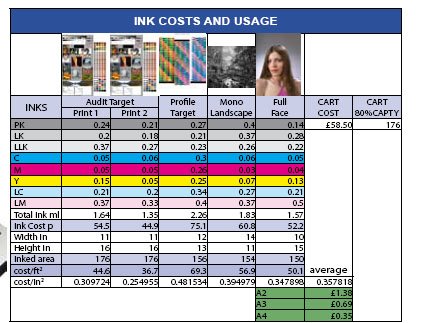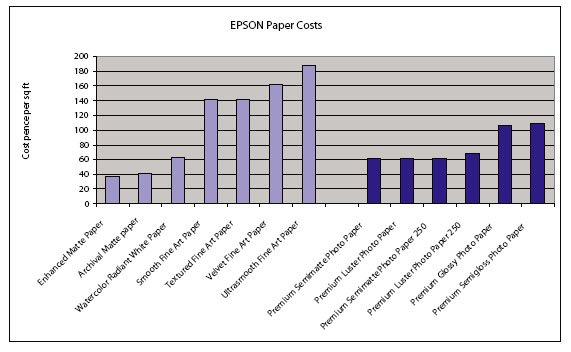articles/Printers/epsonrstuylusprok3-page10
Epson Stylus Pro UltraChrome K3 Printers - part 10 of 1 2 3 4 5 6 7 8 9 10
by Mike McNamee Published

Ink Usage and Changing ink
Unlike the Epson 4000, the 4800 user (and the 7800 and 9800) has to decide between using Matte Black ink and Photo Black ink. Whilst swapping over is relatively straightforward, there are cost implications, indeed the instructions (seven pages of them) carry a health warning - "Because ink charging after black conversion consumes a large quantity of ink you may need to replace the cartridges soon". The 18-step process takes about 20 minutes, during which time you have to be in attendance pushing levers up and down and pulling the various cartridges in and out. It is actually quite straightforward and the instructions are flashed sequentially on the printer's LCD screen. The process also used up 15% of the maintenance tank capacity.
The LFP Utility which is now available for the printers keeps an accurate log of the prints that have been made and the ink utilisation. Below is an extract from the log. This shows that the A3+ ColourAudit target uses around 1.5ml of ink, depending upon the profile, a full face and shoulder shot used 1.57ml and a profile target used the most at 2.26ml, as might be expected. This translates to a cost between 30 and 40 pence per square foot assuming there is no ink wastage from a 220ml cartridge.
What does it cost to run? Armed with accurate ink figures we can make a stab at the cost of print production. We assume that 80% of the ink is delivered to the page and the cartridges cost £36.88 for 110ml and £58.50 for 220ml including VAT. If we take the cost of 24" rolls of Watercolour Radiant White and Premium Luster and average the ink usage across monochromes and colour of different types, then we arrive at around £3.20 for an A2 print on Premium Luster and £3.35 for WCRW, including ink and media. If you want a ballpark figure for cost of ink it is 0.5p/in2 with 110ml cartridges and 0.357p/in2 for 220ml cartridges. These figures are almost double those obtained using the Epson calculator on an ISO 400 image (the one with the penny farthing cycle). This image is light on ink as it is relatively high key. Operating at 2880 rather than 1440dpi amounts to about 17% more on ink useage
PAPER COSTS Calculating paper costs is made difficult by the variation in size and boxing. The data shown right are harmonised to a relative cost per square foot based on A3+ in the largest box available or, failing that for, 24" rolls.

FINAL THOUGHTS
We have shown prints made with the K3 ink set to quite a number of professional and enthusiast photographers with universal acclaim. Both the subjective appearance and statistical data show that these printers are a significant step forward. If you are a hovering professional, about to invest, then consider this. The 4800 costs around £1,300 (Calumet, Ex VAT), however you get £251 of cartridges with the printer so you are actually only paying £1050 for the metalwork. If you slice out the cost of say a Stylus Pro 2400 (also K3 ink) at £495 you are looking to save £550 in the cheaper running costs of the 4800 - which amounts to about eight cartridge sets. It is therefore a no-brainer for a professional, you have to move up! If 17" width is insufficient you have to go up to the 7800 or even the 9800 - remember if you are planning on making canvas wrap, the extra margin needed makes the 24" of the 7800 look a little light. The only cloud in all this is the inability to switch inks easily and at low cost - now you have to decide if you can afford two printers! If you are taken with the ideas put forward in our feature Artistic Endeavours later on, you may need to have the flexibility to print on both gloss and art media. Regardless of your decision, there are three things you no longer have to worry about: metamerism, print life and quality. Well done Epson, go to the top of the class (again)
Please Note:
There is more than one page for this Article.
You are currently on page 10
- Epson Stylus Pro UltraChrome K3 Printers page 1
- Epson Stylus Pro UltraChrome K3 Printers page 2
- Epson Stylus Pro UltraChrome K3 Printers page 3
- Epson Stylus Pro UltraChrome K3 Printers page 4
- Epson Stylus Pro UltraChrome K3 Printers page 5
- Epson Stylus Pro UltraChrome K3 Printers page 6
- Epson Stylus Pro UltraChrome K3 Printers page 7
- Epson Stylus Pro UltraChrome K3 Printers page 8
- Epson Stylus Pro UltraChrome K3 Printers page 9
- Epson Stylus Pro UltraChrome K3 Printers page 10
1st Published
last update 09/12/2022 14:53:59
More Printers Articles
There are 0 days to get ready for The Society of Photographers Convention and Trade Show at The Novotel London West, Hammersmith ...
which starts on Wednesday 15th January 2025




